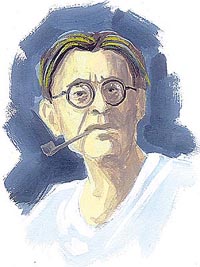WHILE thousands are involved in the unprecedented communal frenzy that follows the announcement of Partition, the inmates of a mental asylum find themselves in a strange situation. The authorities have decided that while the Muslim inmates could stay back, the Hindu and Sikhs would have to go to India. This creates confusion because the inmates have not heard of Pakistan. A Sikh inmate refuses to leave because, when he was brought in, the asylum was in India. What follows is confusion, confusion and more confusion. And as you read you begin to wonder who is insane: the inmates of the asylum or the violent mobs outside, hell-bent on killing anyone who does not belong to their religion. And all though the story, Toba Tek Singh is hilarious, you are not quite sure whether to laugh or cry.
 Many stories have been inspired by the horrors of Partition, but no one portrayed it in so few words, and with such irony as Saadat Hasan Manto, the amazing genius of modern Urdu literature, did.
Many stories have been inspired by the horrors of Partition, but no one portrayed it in so few words, and with such irony as Saadat Hasan Manto, the amazing genius of modern Urdu literature, did.
Born in Samrala, Manto wrote radio scripts, film scripts, produced more than 250 short stories, scores of plays, and essays as well a novella. During World War II, he was with the All India Radio, New Delhi. But the best years of his life were spent in Bombay, where he was associated with leading film studios. He wrote over a dozen films, the prominent of them being: Eight Days, Chal Chal Re Naujawan, and Mirza Ghalib.
Manto's forte was the short story. With cynical wit and brutal frankness, he exposed the decaying social mores and traditions of society that was physically in the 20th century but mentally in the 12th. "In my reform house, I keep no combs, curlers, or shampoos," he used to tell his critics, "because I do not know how to apply make-up on people. . . . Every angel who came to my faculty was barbered thoroughly and in style so that not a single hair was left standing on their head."Manto was tried thrice for obscenity before and thrice after independence. Two of his greatest stories Colder than Ice and The Return were considered obscene by Pakistani censors. He was never really comfortable in Pakistan, for his missed India, especially his beloved city Mumbai. His friend Ahmed Rahik once remarked, "He [Manto] began to die the moment he left Bombay."And like his character from Toba Tek Singh, Manto was in a strange dilemma after Partition:"I found it impossible to decide which of the two countries was now my homeland?"
http://www.tribuneindia.com/2000/20000319/spectrum/main2.htm
No comments:
Post a Comment